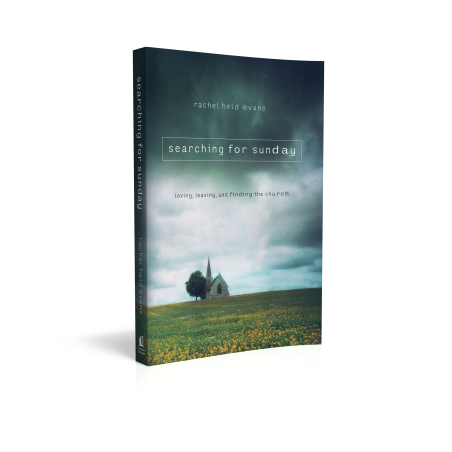Rachel Held Evans grew up, and still lives, in Dayton, Tennessee – about forty minutes outside of my own hometown of Cleveland, Tennessee. In a childhood that eerily mirrored my own: conservative Christian upbringing, religious schooling, and this gentle, general push to question long-held beliefs, we arrived at nearly the same conclusion for political views, post-modern thinking, and general approach to Christianity.

However, for various reasons, I have long been a churchgoer, despite my disagreement with many of their general stances. For one thing, I’m a mother, and it’s important for me to bring my children to a church so that we can build on a basic biblically literate education and we can expound or clarify our personal values and theological backing before we toss them to the wind. Ideally we would attend a more liberal denomination, such as the United Church of Christ, but in the meantime, that’s simply not possible.
I also take the commandment to meet and gather with believers seriously and find it edifying and challenging for my faith. Oh? And I’m an extrovert. While evangelicalism can be downright harmful for introverts, it’s perfect for me, especially considering that at my old church in Cleveland, I just knew so many people. These were the ladies who threw me wedding and baby showers, people who talked to me about my family and actually had genuine interest, and the people who had prayed for me and maybe I didn’t even know it.
I was given the opportunity to review Rachel Held Evan’s new book, Searching for Sunday, during the period of time in which I was desperately seeking God in all the dark corners of my life and wrestling with church in so many ways. While my choice of church is, at least for the time being, a foregone conclusion due to the commitment of my husband’s teaching position, I definitely have (and probably always will) struggle with an inherent love of evangelicalism combined with a desperate desire to change and reformat the typical American Christian worldview espoused by individuals such as Franklin Graham, which, frankly, I find to be harmful and destructive to others, our religion, and ourselves.

In Searching for Sunday, Evans discusses, through the lens of the liturgical calendar and the seven sacraments: baptism, confession, holy orders, communion, confirmation, anointing of the sick, and marriage. Interwoven are stories of heartbreak, death, life, and the eventual conclusion of being a little bit more at home in the Episcopalian church. It’s not clear to me whether or not she ever felt like she “found” Sunday, but I think in the meantime, she’s happier there than she could be at a church that doesn’t support the ordination of women or inclusion of LGBTQA folks. In fact, at one point, she encourages those of us who attend such churches to refuse to attend, and my goodness, do I ever sometimes want to heed her cry and run off to another denomination. But: I can’t. Like so many other situations in my life, I have to make do with my current and present realities.
It’s coincidental and interesting to note that the church that she now attends is actually the first Episcopalian Church I ever attended: St. Luke’s Episcopal Church. One year my family, ever irreverent and rebellious, once protested the attendance of church services on Christmas Day in favor of spending time with family (or more realistically, sleeping in and getting to our presents first). My grandmother was so distraught at the thought of us sinners not going to a Christmas service that she wondered if we might compromise and attend church somewhere else. That’s when she came across the midnight services at St. Luke’s.
That service was transformative to me. It was beautiful, and even then as a young Republican, I found the liturgy, the spoken creeds, the simple hymns, the communal cup of wine (very scandalous for a Pentecostal teenager) for the Eucharist, and the short, sweet homily to be a religious experience unlike any I’ve ever had. Later I would come to occasionally attend Emmanuel Fellowship on Saturdays or liturgical services offered at Lee by their spirit-filled rector, Mitchell Baker, who maybe changed my theology in ways he’ll never fully understand. I attended Anglican and Catholic services during my short time in Europe, and then, of course, attended some of the most blatantly progressive Episcopal services imaginable for almost 40 days, give or take some Saturdays and sick days.
Rachel Held Evans is the storyteller that our generation needs, not just because she represents the background so many of us have, but because she’s so strong in everything that she writes, and Searching for Sunday is no exception. She is, like me, grasping at straws of Christianity in our culture and trying to see what gets rebuilt from the ashes of our broken religion, trying to show Christ to a world that only knows Christians and how different the two seem to be sometimes.
But if you think the entire book is trashing evangelicalism, you would be very wrong. She has a strong stance, yes, but she also feels genuine loss at having to make the choice to exit the movement. Losing your faith is a grief that is unimaginable, but sometimes, on the other side, it is freeing. Neither does she back away from the topic of sin, of which many liberal, progressive writers are guilty. It’s a topic that is hard to broach – but why? We are all deeply flawed and recognizing that is the first step to approaching humility, and it is in humility that Jesus Christ is found. Evans just gets it. You cannot keep insisting that Christians portray this image of capitalism and oppression and be surprised when people no longer wish to turn to Christ.
I liked Rachel Held Evans’ previous books, but I thought it would be very difficult to beat A Year of Biblical Womanhood. And boy, was I wrong. This book was a gift (a literal gift, actually!) and it just found me at the right time. I feel like Rachel Held Evans and I met at a fork in the road and ultimately took two different turns at the road. And one day, I want to find my way back to the crossroads and see what’s down her path. If evangelicalism can change into a simpler, more genuine faith, who’s to say she won’t be there to meet me?
If you’ve ever wondered why anyone would possibly still attend church even after the horrors of discrimination bills, Westboro Baptist, and slut-shaming hiding behind a misogynistic modesty/purity culture, this book is for you. If you’re cynical about faith, Christianity, and the political dome that has been built on supposedly “Christian” values, this book is for you. If you’re in a pastoral position and you are losing church members and you can’t figure out why, this book is definitely for you. I highly, highly recommend it.
And if you’re reading this blog post and you think all this progressive theology is for the birds and you want no part of it, I’m so sorry for you, and I hope you feel the love of Christ in the eyes of the broken community and reconsider your actions toward God’s people. But you, even YOU are loved by an almighty God, manifested through the figure of Christ Jesus. I leave you with a quote from the book:
“The great struggle of the Christian life is to take God’s name for us, to believe we are beloved and to believe that is enough.” – Rachel Held Evans









 These hapless, mistake-prone, animated playing cards (having also brought the cook turnip bulbs when asked for onions) live in constant fear of their overbearing employer, the Queen of Hearts, who demands perfection at the highest price. One slight mistake and it’s off with your head!
These hapless, mistake-prone, animated playing cards (having also brought the cook turnip bulbs when asked for onions) live in constant fear of their overbearing employer, the Queen of Hearts, who demands perfection at the highest price. One slight mistake and it’s off with your head! One of my favorite quotes from War and Peace is “Here I am alive, and it’s not my fault, so I have to try and get by as best I can without hurting anybody until death takes over.” That’s nearly how Tolstoy lived throughout his days, even leaving his wife ten days before his death over such a dispute: he wanted to give away everything he owned to the poor, including his estate with many acres of land, and she wished it to remain in the family. Perhaps rather drastic, but perhaps I romanticize people who can live out the values of Christ in such a dramatic way.
One of my favorite quotes from War and Peace is “Here I am alive, and it’s not my fault, so I have to try and get by as best I can without hurting anybody until death takes over.” That’s nearly how Tolstoy lived throughout his days, even leaving his wife ten days before his death over such a dispute: he wanted to give away everything he owned to the poor, including his estate with many acres of land, and she wished it to remain in the family. Perhaps rather drastic, but perhaps I romanticize people who can live out the values of Christ in such a dramatic way.